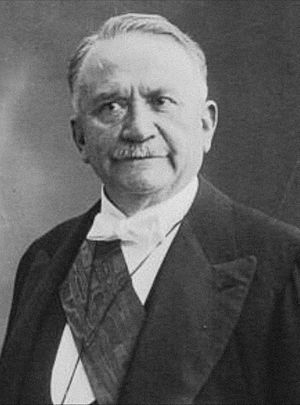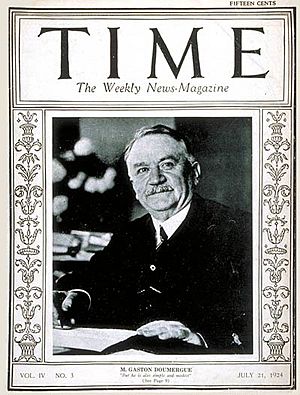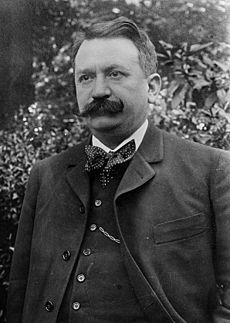Gaston Doumergue facts for kids
Quick facts for kids
Gaston Doumergue
|
|
|---|---|

Doumergue in 1924, as the Grand Master of the Legion of Honour
|
|
| President of France | |
| In office 13 June 1924 – 13 June 1931 |
|
| Prime Minister | Frédéric François-Marsal Édouard Herriot Paul Painlevé Aristide Briand Raymond Poincaré André Tardieu Camille Chautemps Théodore Steeg Pierre Laval |
| Preceded by | Alexandre Millerand |
| Succeeded by | Paul Doumer |
| Prime Minister of France | |
| In office 9 February 1934 – 8 November 1934 |
|
| President | Albert Lebrun |
| Preceded by | Édouard Daladier |
| Succeeded by | Pierre-Étienne Flandin |
| In office 9 December 1913 – 9 June 1914 |
|
| President | Raymond Poincaré |
| Preceded by | Louis Barthou |
| Succeeded by | Alexandre Ribot |
| Personal details | |
| Born |
Pierre-Paul-Henri-Gaston Doumergue
1 August 1863 Aigues-Vives, France |
| Died | 18 June 1937 (aged 73) Aigues-Vives, France |
| Political party | Radical Party |
| Alma mater | University of Paris |
Pierre Paul Henri Gaston Doumergue (French pronunciation: [ɡastɔ̃ dumɛʁɡ]; 1 August 1863 in Aigues-Vives, Gard – 18 June 1937 in Aigues-Vives) was a French politician of the Third Republic. He served as President of France from 13 June 1924 to 13 June 1931.
Contents
Biography
Doumergue came from a Protestant family and was a Freemason. Beginning as a Radical, he turned more towards the political right in his old age. He served as prime minister from 9 December 1913 to 2 June 1914. He held the portfolio for the colonies through the ministries of René Viviani and Aristide Briand from 26 August 1914 to 19 March 1917. In February 1917 he was sent on a mission to Russia and negotiated with Tsar Nicholas II a secret agreement which defined the demands that France and Russia would make in future peace negotiations with Germany and Austria-Hungary. He was elected as the 13th French President on 13 June 1924, the only Protestant to hold that office. He served until 13 June 1931 and again was Prime Minister in a conservative national unity government, after the riots of 6 February 1934. That government lasted from 6 February to 8 November 1934.
He was widely regarded as one of the most popular French presidents, particularly after the controversial Alexandre Millerand, who had been his predecessor. Doumergue was single when he was elected and became the first President of France to marry in office.
Doumergue died at Aigues-Vives on 18 June, 1937 at the age of 73.
Doumergue's First Ministry, 9 December 1913 – 9 June 1914
- Gaston Doumergue – President of the Council and Minister of Foreign Affairs
- Joseph Noulens – Minister of War
- René Renoult – Minister of the Interior
- Joseph Caillaux – Minister of Finance
- Albert Métin – Minister of Labour and Social Security Provisions
- Jean-Baptiste Bienvenu-Martin – Minister of Justice
- Ernest Monis – Minister of the Marine
- René Viviani – Minister of Public Instruction and Fine Arts
- Maurice Raynaud – Minister of Agriculture
- Albert Lebrun – Minister of Colonies
- Fernand David – Minister of Public Works
- Louis Malvy – Minister of Commerce, Industry, Posts, and Telegraphs
Changes
- 17 March 1914 – René Renoult succeeds Caillaux as Finance Minister. Louis Malvy succeeds Renoult as Minister of the Interior. Raoul Péret succeeds Malvy as Minister of Commerce, Industry, Posts, and Telegraphs.
- 20 March 1914 – Armand Gauthier de l'Aude succeeds Monis as Minister of Marine.
Doumergue's Second Ministry, 9 February – 8 November 1934

- Gaston Doumergue – President of the Council
- Louis Barthou – Minister of Foreign Affairs
- Philippe Pétain – Minister of War
- Albert Sarraut – Minister of the Interior
- Louis Germain-Martin – Minister of Finance
- Adrien Marquet – Minister of Labour
- Henri Chéron – Minister of Justice
- François Piétri – Minister of Military Marine
- William Bertrand – Minister of Merchant Marine
- Victor Denain – Minister of Air
- Aimé Berthod – Minister of National Education
- Georges Rivollet – Minister of Pensions
- Henri Queuille – Minister of Agriculture
- Pierre Laval – Minister of Colonies
- Pierre Étienne Flandin – Minister of Public Works
- Louis Marin – Minister of Public Health and Physical Education
- André Mallarmé – Minister of Posts, Telegraphs, and Telephones
- Lucien Lamoureux – Minister of Commerce and Industry
- Édouard Herriot – Minister of State
- André Tardieu – Minister of State
Changes
- 13 October 1934 – Pierre Laval succeeds Barthou (assassinated 9 October) as Minister of Foreign Affairs. Paul Marchandeau succeeds Sarraut as Minister of the Interior. Louis Rollin succeeds Laval as Minister of Colonies.
- 15 October 1934 – Henri Lémery succeeds Chéron as Minister of Justice.
See also
 In Spanish: Gaston Doumergue para niños
In Spanish: Gaston Doumergue para niños
- Interwar France
- 6 February 1934 crisis
- List of covers of Time magazine (1920s) – 21 July 1924 and 2 August 1926


